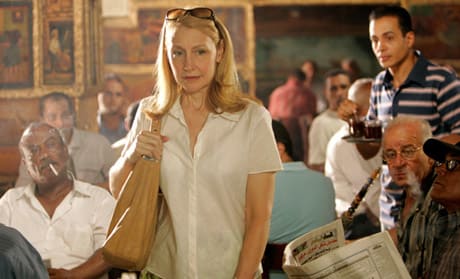For the most part, actors are little more than expensive props used for marketing and aesthetic purposes, as most roles could essentially be handled by any working professional with a rudimentary understanding of the craft.
Making an exception to this rule in Cairo Time, Patricia Clarkson saves what is essentially an unwatchable, pretentious mess by elevating perfunctory dialogue and a blasé story of repressed passion with a fascinating and nuanced subtlety that leaves us wondering what cards she holds in her hands.
Here, Clarkson plays Juliette, a somewhat unhappy magazine editor who decides to follow Mark (Tom McCamus), her Canadian diplomat husband, to Egypt. Unfortunately, escalating tensions in the Palestinian territories leave Mark stuck on hostile ground, while Juliette eagerly waits for him in Cairo, learning the ins and outs from a patronizing but friendly family friend named Tareq (Alexander Siddig).
We get the sense that Tareq wants to shag his buddy's wife but is far too classy to act on his urges, staying on the periphery while the curious Canadian navigates awkwardly through a foreign land, confused by the aggressive advances from young men on the street.
As a magical and poetic examination of space and quiet habitation, Cairo Time excels, with a great deal of narrative focusing on Juliette and her daily travails and peregrinations, with a lingering observational sense. The problem is that eventually people open their mouths and speak, delivering what may very well be the most prosaic, clunky dialogue ever captured on film. "I've always wanted to come to the Middle East," says Juliette, which leads Tareq to remark: "What is this Middle East? What is it in the middle of?" Groan.
Some may find appeal in the quiet melancholy of desires unfulfilled, as the film doesn't wrap up its narrative in a neat package, while others may find this deliberately mysterious nature to be heavy-handed and trite. Where there will be little no contention, however, is in Clarkson's imminently watchable and complex performance.
(Mongrel Media)Making an exception to this rule in Cairo Time, Patricia Clarkson saves what is essentially an unwatchable, pretentious mess by elevating perfunctory dialogue and a blasé story of repressed passion with a fascinating and nuanced subtlety that leaves us wondering what cards she holds in her hands.
Here, Clarkson plays Juliette, a somewhat unhappy magazine editor who decides to follow Mark (Tom McCamus), her Canadian diplomat husband, to Egypt. Unfortunately, escalating tensions in the Palestinian territories leave Mark stuck on hostile ground, while Juliette eagerly waits for him in Cairo, learning the ins and outs from a patronizing but friendly family friend named Tareq (Alexander Siddig).
We get the sense that Tareq wants to shag his buddy's wife but is far too classy to act on his urges, staying on the periphery while the curious Canadian navigates awkwardly through a foreign land, confused by the aggressive advances from young men on the street.
As a magical and poetic examination of space and quiet habitation, Cairo Time excels, with a great deal of narrative focusing on Juliette and her daily travails and peregrinations, with a lingering observational sense. The problem is that eventually people open their mouths and speak, delivering what may very well be the most prosaic, clunky dialogue ever captured on film. "I've always wanted to come to the Middle East," says Juliette, which leads Tareq to remark: "What is this Middle East? What is it in the middle of?" Groan.
Some may find appeal in the quiet melancholy of desires unfulfilled, as the film doesn't wrap up its narrative in a neat package, while others may find this deliberately mysterious nature to be heavy-handed and trite. Where there will be little no contention, however, is in Clarkson's imminently watchable and complex performance.
